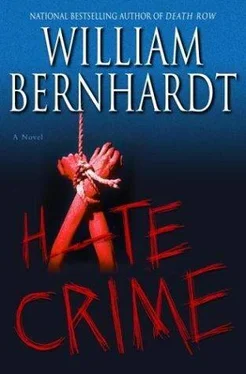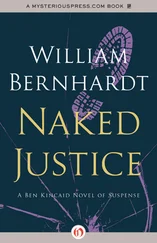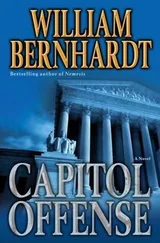Things got better with my mom. After about a month, we started meeting on the sly-having lunch together at the Institute of Art or window-shopping on the Magnificent Mile. But I haven’t spoken to my father in years. The few times I’ve seen him, he just stares at me, examines me like some awful black blot, like I’m a stain on his shirt. He never says anything. Not even hello.
A few months ago, I went to the funeral for my friend Gary’s father. He held it in till everyone went home, then cried like a baby all night long. You can’t imagine what it feels like, he kept saying. I mean, you’ve known your father all your life. He’s a part of you. And then, one day, he’s gone. It changes everything.
I held Gary all night long, trying to comfort him, because I think I understood what he was going through better than he realized. It’s even worse, I thought to myself, when you’ve lost your father-and he only lives about two miles away.
Christina berated herself all the way to the courtroom. Good grief, girl. It’s not as if this is the first time you’ve ever come to a courthouse by yourself. But Chicago was a very different city; skyscrapers towered all around her, and everyone seemed so busy, busy, busy. She dodged taxicabs seemingly intent on murder as she crossed the street, avoiding well-dressed panhandlers on her way up the courthouse steps. Yes, there was something different today, but it wasn’t just the fact that she was away from home. It wasn’t the pressure, the imminent trial date, the parade of protesters camped outside the courthouse. She had been spilling files and dumping coffee on her briefs and generally acting like a flibbertigibbet all morning long. It wasn’t her usual leitmotiv, and she didn’t like it a bit.
She intentionally arrived early so she would have a chance to meet the district attorney, Richard Drabble, in his office-not in the courtroom. She still hoped she could talk some reason into him; there was no reason for a protracted trial played before all America. Surely they could reach some sort of understanding. And she wanted a chance to size the man up, to get some idea who she was up against. She’d seen him on television, of course, but it wasn’t the same. When she met someone face-to-face, looked into their eyes, shook their hands-that’s when she started to get a picture of who this person really was.
She found the DA’s office near the door and introduced herself to the receptionist. She was surprised-and impressed-when the man himself appeared barely more than a minute later.
“A pleasure to meet you, Ms. McCall. Thank you for stopping by.”
She took his hand. “I’m sorry I couldn’t drop in sooner.”
“Very brave thing you’ve done-taking over this case on such short notice. And with so little prep time.”
“Well, you have to play the hand you’re dealt.”
“Isn’t that the truth.” He chuckled. He was a handsome fellow, Christina thought-intense blue eyes, a square jaw, salt-and-pepper hair. Early fifties, she guessed, but the years were making him look stronger and more distinguished, not less. “Is there anything I can do for you?”
“Well,” she said, clearing her throat awkwardly, “I did wonder if you’d consider any sort of deal that-”
He held up his hand. “I’m sorry, Ms. McCall, I can’t. There’s just too much pressure bearing down on us, demanding a conviction. And frankly-our case is too strong. I don’t envy your position at all. I know you can’t win, but I sincerely hope you can save face and not appear incompetent.”
“Or perhaps I prefer cases that come with built-in excuses because I really am incompetent.”
He flashed some teeth. “Don’t be modest, Ms. McCall. You’ve had a distinguished little career. Not many legal assistants make it to your level.”
She hesitated. “But-you understand-I’m a lawyer now.”
“Of course. But that’s a recent development, right?”
“Well, relatively speaking, I suppose.” And your point is?
“Most of your death penalty cases have actually been handled by your partner. What’s his name again?”
“Ben Kincaid,” she said slowly.
“Right, right. You two handled that cop killer case. Very impressive.”
“Well… thank you.”
“I’m glad I haven’t had anything like that on my watch. This Barovick case has been my highest profile gig yet, and I’m glad of it. I just want to do my job, without all the interference you had to brook in that case. Of course, Tulsa is not Chicago by any means. You don’t have our resources. I’d like to think we could’ve taken care of that here in one trial and a lot less time. But it all worked out in the end, right?”
“Riiiiight.”
“Have you met Judge Lacayo yet?”
“Haven’t had the pleasure.”
“Well, he hasn’t always been the most open-minded about women lawyers. Especially as lead counsel in important cases. But I’m sure it will be fine.”
So was this guy deliberately trying to psych her out, Christina wondered, or was it just the effect of her own insecurities impinging on an innocent conversation? Didn’t matter-time to bring this conversation to a close.
“I should probably be getting to the courtroom.”
He checked his watch. “Oh, me, too. Gotta meet a reporter first, then I’ll be right there.”
“Can you give me directions?” Christina asked. “This is my first time here.”
“No problem. Lacayo’s courtroom is not in this building. Cross over on the catwalk to Building Two, then keep going to Building Three. Take the elevator down to the basement and turn left. His courtroom is the last one on your right.”
“Got it. Thanks.”
“Sir,” the receptionist said, interrupting, “here are the briefs you wanted.”
He appeared mildly distressed. “Oh, geez, Mona, I can’t carry those to my interview. What would the reporter think? I told you to have them couriered to the courtroom.” Again he glanced nervously at his watch. “Now it’s too late.”
“No problem,” Christina said. “I’ll take them.” She held her briefcase horizontally in both hands, taking the tall stack of manila envelopes on top.
“Are you sure?” Drabble said with concern.
“It’s a snap. See you in a few minutes.”
“Yes, see you.”
Fifteen minutes later, she was five minutes late, still hauling all those papers, sweating profusely, and nowhere near the courtroom. She had found Building Two with ease, but somewhere along the way to Three, she’d gotten lost. She’d ended up on the wrong side of the building and had to go down to the ground floor and reenter in order to get to the catwalk. It took her forever to find the elevator; her arms felt as if they were about to give out. With great relief, she punched the button marked B.
And stepped out to find nothing.
Not nothing in the strictest sense, but no sign of life. Before her was a dirty, dank corridor filled with cleaning supplies and a floor waxer. Certainly no courtrooms. Not even close.
She glanced at her watch again. Ten minutes late, now.
She’d been hometowned.
Summoning her strength, she got back in the elevator and ran all the way to Building One. She got directions from the man at the newsstand. Turned out Lacayo’s courtroom was near the front door-just down the hall from where she and Drabble had had their little conversation. By the time she finally arrived, she looked as if she’d just run the marathon and was almost twenty minutes late. She assiduously avoided the throng of reporters and spectators and made her way to her table.
“You look as if you could use a hand,” Drabble said, offering to take some of the paper load.
“Imagine that,” Christina said, as she dumped it all on the defendant’s table.
Читать дальше









